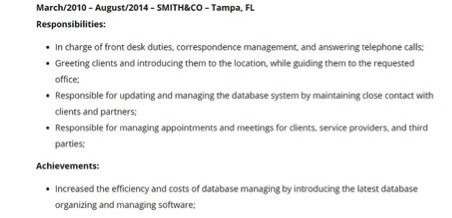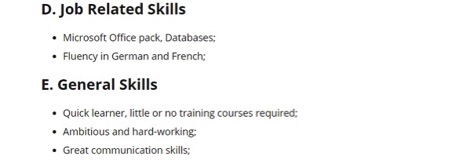Administrative assistant positions are essential to companies in almost every industry. Their jobs are often challenging but rewarding, which is an attractive mix for new grads or students who want to work during summer. However, to get there you will need an appealing, flawless administrative assistant resume.
Becoming an administrative assistant is relatively easy, as you usually only need at least a bachelor’s degree. Computer and communication skills, together with on-the-job training, are mandatory.
The rewarding side consists of a $36,500 yearly pay, according to the U.S. Bureau of Labor Statistics. Still, many fail to become assistants from the first stage of the process — sending an attractive-application file.
To help, we have compiled the essentials of writing a successful administrative assistant resume, together with tips from experts.

The Must-Haves of a Winning Administrative Resume
1. Contact Information and Summary
The administrative assistant resume can include a photograph, but this is not mandatory. If you plan to include one, make sure it’s a professional-looking picture. To see how a resume should look and what’s the best layout for the picture and categories, click here.
Your complete name, address, email address and phone number should be in the upper side of your resume. You begin your written presentation by showing recruiters they can easily reach you. The summary is a three-sentence business card that includes your past, present and skills.
Even if you haven’t previously had a job, perhaps attended workshops, courses or internships. So, what should you include in the summary?
— Career experience or college achievements.
— Detailed skills with software names.
— General skills and projects which emphasize them.
2. Paragraphing and Layout
Administrative assistant resumes show a glimpse of the applicant’s skills. How? Each paragraph, sentence and dot speak about you.
Make sure you use the same font and refrain from bold, italic or underlined words unless necessary. Information speaks for itself if you say it professionally.
According to a study, recruiters decide if an applicant should get attention after looking at their resume for six seconds. They eye scan the resume, spending 80 percent of the time studying the below:
— Applicant’s name
— Current title and company, together with start and end dates
— Previous title and company, together with start and end dates
— Education
If this information is easy to find, recruiters have a few more seconds left to get impressed with your resume. Therefore, readability matters as much as your skills to compose information. Once the six seconds pass, employers start looking for key words of interest for their job opening.

3. Job-Related Experience
Add present or previous jobs by summarizing your responsibilities and emphasizing tasks that may be relevant to your future job. Keep it short – around three – five dots having one sentence each. Mention whether a job or internship was project-based or part time.
Achievements should show your contribution to the company’s overall activities and sales. This is not a category where you should add congratulations or performance bonuses.
Take this category as a place to emphasize what you left behind when you’ve left the company. Achievements show that you’re proactive and have successful initiatives. Also, keep this category brief: one – two dots answering the questions what? and why?

4. Skills and Abilities
Skills should be in your resume in two categories that help recruiters reach a conclusion. According to a study by TimeJobs, recruiters care most about communication, leadership, teamwork and collaboration, analytical and adaptability skills.
However, this data adjusts to the administrative assistant work:
— Job-related skills: Include software knowledge, and relevant skills from past tasks (such as organizing meetings or inventory management). You can consider major bachelor’s or master’s projects.
— General skills: These are the so-called soft skills that show your views on work and focus areas. Feel free to include examples such as communication skills, teamwork or time- or crisis-management skills.
The skills category can also include abilities earned based on courses. The trainings that matter for recruiters are the Certified Administrative Professional (CAP) and the International Association of Administrative Professionals (IAAP) one-year program.
Administrative Assistant Resume Tips from Experts
What to Do:
— Your application file should be complete and look personalized for the job you want. Make sure that you also include a cover letter next to the resume.
— Keep the resume below two pages, even if you are experienced. Too much information makes your resume less readable.
— Make sure your education category includes information such as college, degree and field of study, year of graduation or enrollment.
— Give examples of leadership skills. They are essential as they also draw the outcome of your career. Leadership might later turn you into a human resources specialist or a marketing assistant.
— If you have an online portfolio due to projects that might be relevant for your future job, feel free to include its link in the resume.
What Not to Do:
— Forget about recommendations, if they’re not required. However, if your former boss is known in the business world, include them in the application file. Don’t mention recommendations as available upon request – no one asks for them as it’s not part of the recruitment process.
— Include only information that is relevant to your potential job. If you had jobs in another field, you can only mention them without providing details.
— Some add hobbies to their resume. Make sure that you only include them if they’re relevant to the job. However, refrain from mentioning religious, political or controversial aspects or activities.
— Don’t skip the editing part of the process. Re-reading your resume helps you remove any potential typos or information that isn’t relevant.
If you’d like to dive into the corporate world, prepare your administrative assistant resume and complete your application file. Recruiters might call you for an interview and pave your way to career success!















